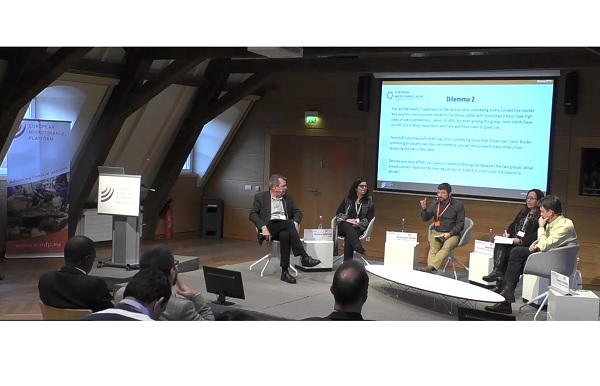 Closing plenary at EMW 2019;
Credit: e-MFP
Closing plenary at EMW 2019;
Credit: e-MFP
European Microfinance Week, organised by the Luxembourg-based European Microfinance Platform (e-MFP), came to a close on Friday in Luxembourg with an urgent call to action on climate change, as well as a debate on the limits of client choice.
The closing plenary entitled "Responsible client choices in finance: whose responsibility is it?" saw panellists Gerhard Coetzee (CGAP), Roshaneh Zafar (Kashf Foundation), Timothy Ogden (Financial Access Initiative) and Mayada El-Zoghbi (new Managing Director of CFI) divided into two adversarial teams, arguing for either the primacy of client choice and autonomy on the one hand or the need to protect clients from poor decisions on the other.
The debate, live-streamed by NextBillion, saw arguments on the role of regulators in constraining poor choices and low-quality products, whether providers or regulators are ever in the position to evaluate clients' choices and when that judgment becomes paternalistic, as well as the importance of encouraging longer-term thinking over short-term needs and preventing harm to those who lack the means to make fully informed decisions. This session was not about awarding prizes but sought instead to generate free-flowing debate in a more adversarial framework which invited the audience to consider difficult ethical dilemmas.
Friday morning had opened with a plenary entitled "Protecting the working poor in the 21st century through responsible finance". Khady Sakho (FORIM), Maya Kobalia (JSC MFO Crystal, Georgia), Guy Stuart (Microfinance Opportunities; MFO) and Rehana Riyawala (SEWA, India) then took part in a panel discussion that ranged widely from the financial needs and activities of garment workers in Bangladesh, the role of financial services for migrant workers in North Africa and the diaspora abroad, the collective power achieved by Indian women in the informal sector via the SEWA trade union and bank and the importance of building financial literacy among entrepreneurs to manage their credit risk.
Beyond the plenaries, this year's conference involved a diverse and interesting range of sessions, featuring over 90 organisations and covering topics such as impact investing, education, use of data in climate resilient agriculture, measuring outcomes, the Atlas data platform, financial health, financial inclusion in Bangladesh, savings, refugee finance, cooperatives and cyber security, among others. Many of these themes were explored in e-MFP's "Financial Inclusion Compass 2019", the second e-MFP survey of financial inclusion trends, which launched on Thursday and which distills the short, medium and long-term ideas, aspirations, concerns and predictions from stakeholders all across the inclusive finance sector.
"Strengthening Resilience to Climate Change" was the topic of the €100,000 European Microfinance Award 2019, and Thursday evening saw the long-awaited ceremony at the European Investment Bank (EIB), presenting the three Award finalists and the winner: APA Insurance of Kenya, which provides index-based agriculture insurance to cover yields and livestock and thus provides farmers with a safety net in a context of growing climate-driven risk.
In this context, Minister for Cooperation and Humanitarian Affairs, Paulette Lenert, stated that the Ministry's Luxembourg Development Cooperation has been among first movers in the finance ecosystem worldwide and observed the importance of facilitating services that go beyond just credit to the poor: "The focus of a donor country should not just be on the credit, but on the innovation", including "business training, financial education and technical assistance".
For his part, Dr. Werner Hoyer, President of the EIB, praised the outstanding applications from the two other finalists, ASKI (Philippines) and Financiera Fondo de Desarrollo Local (Nicaragua) and said that climate change "is an existential threat for many nations and communities. How we combat and adapt will shape our future. The three finalists of the European Microfinance Award, and APA Insurance Ltd in particular, are delivering innovative solutions for the financial sector to support vulnerable communities in tackling the effects of climate change".
The ceremony keynote address was given by Sunita Narain, Director General of the Centre for Science and Environment, and represented a passionate call for urgent efforts to mitigate and adapt to the effects of climate change on the world's most vulnerable, the "victims" who have not contributed to the problem, who are made "even more marginalised" and whose "pain makes the world more insecure".
This sentiment was echoed by e-MFP's Chairwoman Laura Hemrika the next afternoon, when she closed European Microfinance Week with a call for increased engagement by the financial inclusion sector, which as the work over the previous year on the Microfinance Award has shown, can play an indispensable role in helping those most affected prepare for a difficult future.








